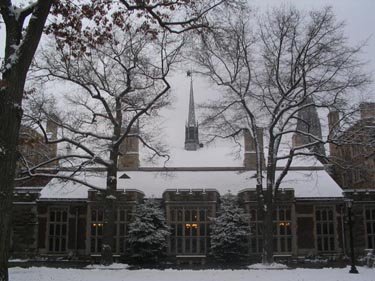
The dining hall of my personal Hogwarts.
Ross Douthat explained last year why the Harry Potter books struck such a chord in our contemporary meritocratic world.
[I]f you take the Potterverse seriously as an allegory for ours, the most noteworthy divide isn’t between the good multicultural wizards and the bad racist ones. It’s between all the wizards, good and bad, and everybody else — the Muggles.
For the six readers who have never read the Potter books but who have stuck with the column thus far nonetheless: Muggles are non-magical folks, the billions of regular everyday human beings who live and work in blissful ignorance that the wizarding world exists. The only exception comes when one of them marries a wizard or has the genetic luck to give birth to a magic-capable child, in which case they get to watch their offspring ascend to one of the wizarding academies while they experience its raptures and revelations secondhand.
The proper treatment of Muggles, meanwhile, is the great controversy within the wizarding world, where the good guys want them protected, left alone and sometimes studied, while the bad guys want to see them subjugated or enslaved (and all the Muggle-born “mudbloods†purged from the wizarding ranks).
All of this plays as an allegory for racism, up to a point … but only up to a point, because what’s notable is that nobody actually wants to see the mass of Muggles (as opposed to their occasional wizardish offspring) integrated into the wizarding society. Indeed, according to the rules of Rowling’s universe, that seems to be impossible. You’re either born with magic or you aren’t, and if you aren’t there’s really not any obvious place for you in Hogwarts or any other wizarding establishment.
So even from the perspective of the enlightened, progressive wizarding faction, then, Muggles are basically just a vast surplus population that occasionally produces the new blood that wizarding needs to avoid becoming just a society of snobbish old-money inbred Draco Malfoys. And if that were to change, if any old Muggle could suddenly be trained in magic, the whole thrill of Harry Potter’s acceptance at Hogwarts would lose its narrative frisson, its admission-to-the-inner-circle thrill.
Which makes the thrill of becoming a magical initiate in the Potterverse remarkably similar to the thrill of being chosen by the modern meritocracy, plucked from the ordinary ranks of life and ushered into gothic halls and exclusive classrooms, where you will be sorted — though not by a magic hat, admittedly — according to your talents and your just deserts.
I am stealing this magic-and-meritocracy parallel from the pseudonymous blogger Spotted Toad, who wrote a fine post discussing how much the Potter novels and movies trade upon the powerful loyalty that their readers feel, or feel that they should feel, toward their teachers and their schools. But not just any school — not some suburban John Hughes-style high school or generic Podunk U. No, it’s loyalty to a selective school, with an antique pedigree but a modern claim to excellence, an exclusive admissions process but a pleasingly multicultural student body. A school where everybody knows that they belong, because they can do the necessary magic and ordinary Muggles can’t.
Thus the Potterverse, as Toad writes, is about “the legitimacy of authority that comes from schools†— Ivy League schools, elite schools, U.S. News & World Report top 100 schools. And because “contemporary liberalism is the ideology of imperial academia, funneled through media and nonprofits and governmental agencies but responsible ultimately only to itself,†a story about a wizarding academy is the perfect fantasy story for the liberal meritocracy to tell about itself. …
In the Potter novels the selective school is conterminous with wizarding society as a whole (allowing for some elves and goblins to do maintenance and keep the books), and thus the threats to that world’s liberal integrity all come from within the academy’s walls, from Slytherin House and its arrogant aristocrats, who must be constantly confronted in the halls and classrooms of the beloved school itself. Voldemort, the dark lord, has Muggle blood, but he isn’t trying to rally an army of non-magic-wielders to seize Hogwarts’ towers; he’s trying to remake meritocratic — er, magical — institutions in his own dark image. And so the battle for Harvard — er, Hogwarts — is the battle for the world.
Which is basically the premise of a great deal of youthful liberal activism these days — that once the last remnants of Slytherin are eradicated from the leafy quads of Yale or Middlebury, once Draco Malfoy’s frat or final club is closed and the last Death-Eater sympathizers purged from the faculty, then the battle of ideas will have been finally and fully won.
But what house was Boris Johnson in?





Please Leave a Comment!